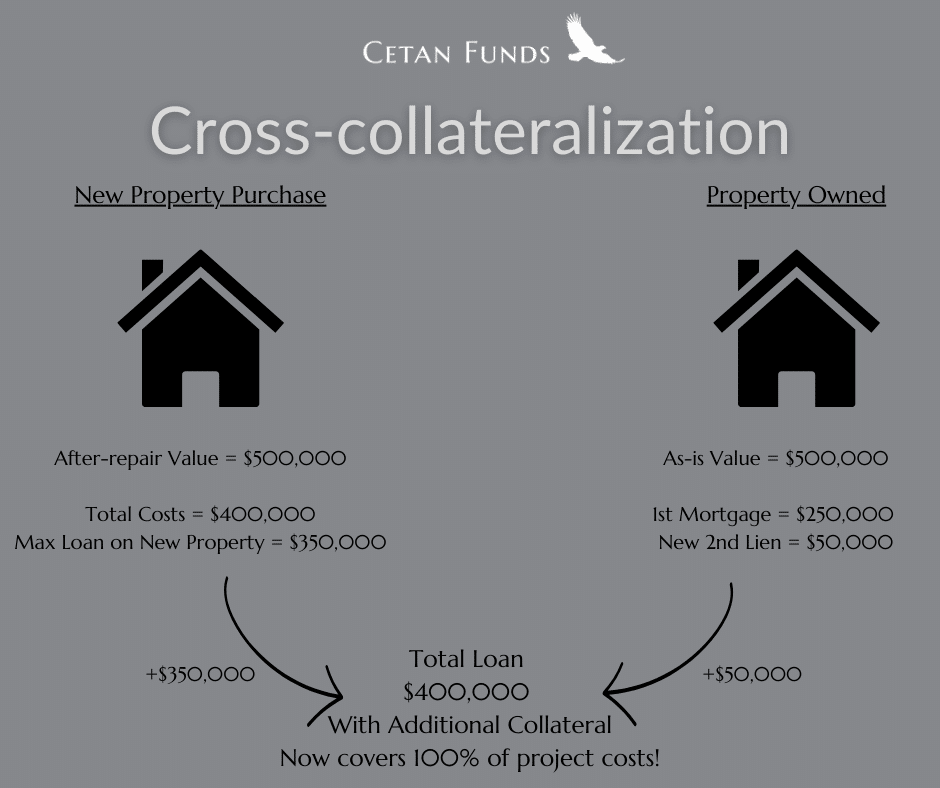
If you’ve purchased a home or invested in a rental property in the past, you may be familiar with the feeling of pride and achievement that comes with seeing the value of your real estate investment go up. The equity you’ve built can take you even further as you consider adding more real estate to your investment portfolio.
Unsure how to leverage equity for new investments? You’re in the right place. Keep reading to learn how.
To start, equity is the portion of your property’s value that you own outright—essentially, the difference between your property’s market value and the balance of any loans secured against it. Now how can you use equity as a strategy to purchase more real estate?
There are several ways to approach this type of real estate investment strategy. Let’s take a look at a few ways to make the equity in your property work for you.
Hard Money Loans
Using the equity you’ve gained to get started on your next real estate project using a hard money loan can be one route to take. These are the types of loans we specialize in.
For example, if you own a rental property without any debt on it, you can quickly pull out cash using a hard money loan with your rental property as collateral. This loan can be used to buy a new property with cash. Underwriting these loans is straightforward and often faster than other loan types.
If you own a property free and clear and it’s worth more than the property you’re buying, it could be easy to use your existing equity to buy the new property. This is a good way to invest in a fix-and-flip opportunity because you can use the equity in your current portfolio to avoid more time-intensive rehab loans. You can buy another piece of real estate and do the repairs all while using the hard money loan on your rental to give you the cash you need right away.
When the new property is sold or refinanced, you’d use the proceeds to pay off the hard money loan, the lien is released, and the equity is available to do it again on another new property. Making your equity work for you in this way allows you to continue to buy more properties, and continue to repeat the process, resulting in more real estate investments in your portfolio.
Bridge Loans
A bridge loan is another way to leverage the equity you have in a currently owned piece of real estate.
If you own an investment property that you’re currently trying to sell, but you’re ready to buy a new property, such as for a 1031 tax-deferred exchange, a bridge loan can loan on both properties to help you close on the new purchase before the old property has sold. This type of loan bridges the gap.
When you finally sell the old property, you can pay some of the loan back to release the lien on the old property only or pay all the loan back to release the lien on both the old and new property. In either case, you’ve added a new property to your portfolio with the help of a short-term bridge loan.
This is a loan type we offer and you can learn more about it here.
Cross-Collateralization
Cross-collateralization is another strategy worth looking into, but many lenders may not have the insight to identify that as an option or be able to execute it. Here at Cetan Funds, our team is ready to help you decide if this choice would be a good fit for you. First, let’s talk about what cross-collateralization is.
With cross-collateralization, a borrower uses one of our short-term hard money loans to purchase a new property and instead of putting cash down, they use a property they already own as additional collateral for the loan. The property they’re buying is used as the primary collateral for the new loan. The property they already own is used as secondary collateral and has a new lien put in place by the lender. This new lien on the rental is usually a second lien behind the first mortgage.
Here is a visual idea of how cross-collateralization works:

Some benefits of cross-collateralization are:
- Higher loan amount, low or no cash down
- Leveraging existing assets rather than having to use cash
- Streamlined application and underwriting process with sufficient collateral
Cross-collateralization can come with some risks though, such as in the events of default or bankruptcy. Working with a knowledgeable team like Cetan Funds is imperative to establishing a real estate investment strategy that can give you the best information and plan for developing a loan that will maximize the equity you have for your next project.
Home Equity Line of Credit (HELOC)
Utilizing the equity through a HELOC can be another way to use the equity you already have to do repairs or updates on your investment property, or to put money down on a fix-and-flip or rental rehab project.
Your local credit unions are great sources for this type of loan, but most only offer these on primary residences. Some banks also have investment property HELOC’s available. We recommend calling several credit unions and banks to see who offers the best options for you.
Cash-Out Refinance
Besides hard money loans, borrowers can get conventional cash-out refinances. In our current interest rate environment, it’s tough to cash flow on a rental with a large mortgage – investors should proceed with caution and do their research to see if this is the best option available to them.
Another thing to consider is if Fannie Mae or Freddie Mac loans are being used. If so, you should keep in mind that you have to have owned the rental for 12 months or more before qualifying for cash-out refinancing on these loans. If you have owned the property for less than 12 months, then Fannie Mae and Freddie Mac conventional loans do not offer cash-out and would only offer rate and term refinances.
When choosing the best way to leverage the equity in your current real estate investment, it can be helpful to talk to someone like our team at Cetan Funds to clarify the many types of loan options you could consider.
Using the equity you have to develop more real estate investments is a great way to grow your portfolio. Whether you want to use the equity you have as a down payment, or increase existing equity through renovations, you have plenty of options to explore.
If you have equity from a current real estate investment, you have a lot of leverage to create more wealth. Come in and see our team at Cetan Funds to map out the way to your next real estate project.
Loan Inquiry
For more information on how Cetan Funds can finance your real estate project, please fill out our inquiry form below. We will respond in two business days.
Your Contact Information
Information collected will only be used to evaluate your loan.
Investor Inquiry
For more information about investing in Cetan Income Fund, please fill out our inquiry form below. We will respond in two business days.
Your Contact Information
Information collected will only be used to contact you.
Broker Inquiry
If you have a deal you need help funding or want to inquire about our Broker Referral Program, please contact us below.
Your Contact Information
Information collected will only be used to contact you.
General Inquiry
We’d love to hear from you. Please submit your inquiry below and we will respond in two business days.
Your Contact Information
Information collected will only be used to contact you.
BORROWER FAQs
What is a Private or Hard Money Loan?
Private and hard money loans come in many variations, but most are short-term loans provided by an investor or group of investors when conventional financing is unattainable or undesirable.
Most private lenders and hard money lenders, like Cetan Funds, finance projects like fix and flip rehabs, rental properties, commercial bridge loans, land development, and many other unusual or unconventional properties and projects. A private or hard money loan can help real estate investors, developers, builders, and small businesses grow their portfolios and businesses faster than they could on their own.
Here at Cetan Funds, we empower people to build wealth through real estate.
Why choose hard money vs. bank loans?
Hard money (or private) loans are built for speed and flexibility. Banks often require months of paperwork, strict borrower qualifications, and rigid underwriting standards. At Cetan Funds, we base our lending decisions primarily on the value and potential of the property, not just the borrower’s financial profile. This means we can finance properties and projects banks typically decline due to condition, complexity, or unusual circumstances.
Hard money loans are ideal for time-sensitive opportunities like fix-and-flip projects, new construction, or land development.
Where Does the Money You Lend Come From?
Cetan Funds offers two pooled private equity fund investments for Oregon residents who qualify and accredited investors. Our two funds, called Cetan Income Fund and Cetan Opportunity Fund, serve as the primary source of capital for the loans that Cetan Funds originates.
Rather than matching individual investors to individual loans, or borrowing capital from banks or Wall Street as many hard money lenders do, at Cetan Funds, we manage our own pool of funds. The investors own shares of their fund limited liability company and the principals of Cetan Funds manage the portfolio of loans owned by the fund. All loans are serviced by Cetan Funds. To learn more about the advantages of this structure, please contact us.
What Types of Loans Does Cetan Funds Finance?
We can lend on most commercial and residential property in Oregon and SW Washington if the loan is for business or investment purposes. We provide short-term financing for bare land, land development, new construction, rehabs, and residential and commercial bridge loans.
Do You Lend on Primary or Secondary Residences?
No. We can only lend for business or investment purposes and do not lend on owner-occupied residential properties. Check out our blog to learn more about what we do and what we don’t do.
Where Do You Lend?
We lend exclusively in Oregon and SW Washington because we know the market well and are committed to helping grow our local market. We lend primarily in Western, Southern and Central Oregon with an occasional loan in Southwestern Washington.
Do You Only Look at the Property/Collateral?
While we are primarily a “collateral-based lender,” we do not solely look at the property/collateral. In our experience, who you lend to is just as important as what you lend on.
We strive to build long-term relationships with our borrowers, and we cannot achieve that if we focus solely on their real estate. So, we also take into consideration character, capacity, capital, and other conditions.
Weighing these important factors, which are often overlooked by other private and hard money lenders, helps us accurately measure risks for both our borrowers and our investors while allowing us to offer better all-around results for our clients.
Do You Have Minimum or Maximum Loan Sizes?
How Long Are Your Loans?
We offer loans as short as 3 months and as long as 60 months; however, most of our loans are for 6 to 12 months. Plus, we build in automatic extensions to every loan to ensure borrowers have time to deal with unexpected events and circumstances.
What Are Your Application and Underwriting Requirements?
Cetan Funds loans are customized to fit each specific scenario. Therefore, application and underwriting requirements can often vary depending on the situation. Typically, we require the following:
For Applications:
- Cetan Funds Business Loan Application (online form, link provided by your loan officer)
- Personal financial statements for all loan guarantors (form provided)
- Property/project description
- Summary of construction or investment experience (if applicable)
For Underwriting:
- 2 years of tax returns for all loan guarantors
- 3-6 months of bank statements
- Project/property-specific documentation (such as purchase/sale agreements, lease agreements, business financials, etc.)
- Detailed rehab or construction plans and budgets (if applicable)
Please contact us for more information on the application and underwriting requirements for your specific scenario.
How Fast Can I Get a Loan Decision?
How fast is funding?
We pride ourselves on moving quickly. Loan decisions are typically made within 1–2 business days, and pre-approval can often be issued just as fast. Once approved, we can close and fund in as little as 3–5 business days, depending on the project and documentation. That speed lets you secure capital and act on opportunities without the delays common with traditional lenders.
Can I Get Pre-Approved?
How Fast Can You Fund and Close a Loan?
As quickly as 3-5 days.
What is Your Minimum Down Payment?
What Are Your Interest Rates?
Rates vary depending on the project. Typically, annual interest rates are 10-12%. Interest is only charged on the outstanding balance. Therefore, interest is not charged on construction or rehab funds until they are drawn. So, for most of our short-term construction and rehab loans, borrowers actually incur far less than 10-12% in interest expense. For more information, please contact us.
What Are Your Loan Fees?
Origination fees vary depending on the project. Typically, origination fees are 2-4% of the loan amount. We also charge a $995-$1,495 administrative fee at closing.
Can I Live in the Property While I Have This Loan?
Unfortunately, no. Our borrowers cannot live in the residential properties we finance for them.
The only exception is in very specific commercial loan scenarios. If you wish to get a loan on a property you would like to live in now, or in the future, please contact us so we can help you find a lender for that. We are happy to help.
Can I Pay Off My Loan Early?
Do You Fund Rehab and Construction Loans?
On Rehab or Construction Loans, Do You Charge Interest on the Full Loan Commitment?
No. Interest is only charged on the outstanding balance.
How Do Construction Draws Work With Your Loans?
Construction draws are typically disbursed for work completed, materials purchased, or subcontractor invoices ready to be paid. Borrowers work directly with their loan officer, their main point of contact from start to finish on the project, to submit draw requests up to twice per month.
We do not charge fees for construction draws. Draw requests include a breakdown of the items awaiting reimbursement or payment, evidence showing the completed work or materials on site, and copies of subcontractor invoices or receipts over $2,500-5,000. Draws are typically processed in 24-48 hours.
Do You Fund Loans on Bare Land?
Yes, we provide bare land loans. Each situation is different. Please contact us for details.
Do You Finance Mobile or Manufactured Homes?
What is “Cetan”?
Cetan comes from the Lakota language and means “hawk spirit.” We chose it to represent the values we bring to lending: vision to see opportunities, loyalty in building long-term relationships, and speed in delivering funding when it’s needed most.
Supporting local organizations like the Cascades Raptor Center also helps us honor that connection to hawks and our beautiful raptors in the Pacific Northwest while giving back to the community.

